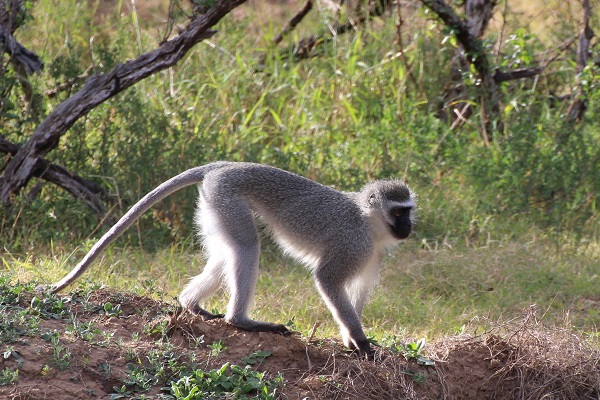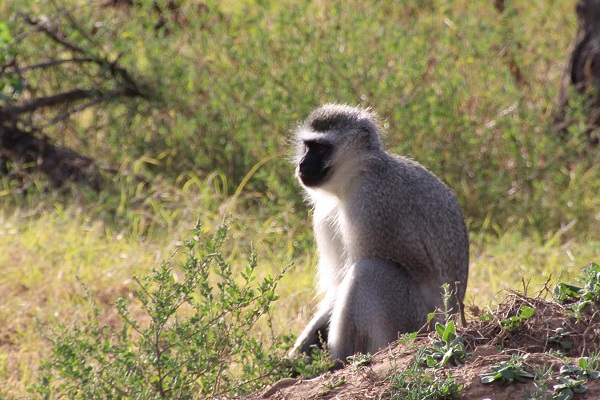Vervet monkeys do not get AIDS, says new research
 Vervet monkey (Chlorocebus pygerythrus) in South Africa. Credit: Anna J Jasinska
Vervet monkey (Chlorocebus pygerythrus) in South Africa. Credit: Anna J Jasinska
Vervet monkeys infected with SIV (HIV cousin) do not get AIDS, according to new research.
Dr. Anna Jasińska from the Institute of Bioorganic Chemistry of the Polish Academy of Sciences, who studied vervet monkeys as part of her work at the University of California in Los Angeles, found that after infection, the composition of the microbiome (microflora), which plays an important role in the development of AIDS, changes differently ion the monkeys than in humans.
Vervet monkeys (genus Chlorocebus), also known as vervets, are a widespread species of primates in Africa south of the Sahara.
Seventy-eight percent of adult female vervet monkeys and 57 percent of adult males are infected with the SIV virus. SIV evolved into the HIV virus that causes AIDS in humans. SIV infection (for example in macaques, which are not natural hosts of the virus) can also lead to AIDS (acquired immune deficiency syndrome). Meanwhile, despite the fact that the virus attacks their immune system, vervet monkeys cope very well with the infection. Symptoms of the acute phase of the disease resemble mild flu and disappear after a few weeks. And although animals transmit the virus for the rest of their lives (chronic phase), it is not a lethal threat to them.
Dr. Jasińska said that vervets, which are natural hosts of SIV, have been infected with the virus for hundreds of thousands of years. She said: “This results from our molecular clock research, which uses the number of virus mutations accumulated over time to assess the age of the virus.”
As a result of natural selection, today's vervets are descendants of those individuals that coped relatively better with SIV. Dr. Jasińska compares the responses of vervet monkeys and humans to infection with viruses attacking the immune system.

Vervet monkey (Chlorocebus pygerythrus) in South Africa. Credit: Anna J Jasinska
Publishing her findings in the journal Microbiome, Jasińska found how differently the microbiome of vervet monkeys and humans changes as a result of viral infection. The microbiome is the group of organisms that inhabit a given organism (bacteria, fungi, archaea) and form complex ecosystems. She said: “The correct composition of the microbiome is very important for maintaining homeostasis (balance) of the body. If the microbiome is not healthy, we are not healthy either.
“In humans, there are extensive changes in the microbiome after HIV infection; the composition of metabolites produced by bacteria changes; the function of the intestinal immune barrier is disrupted and the pathogenic phenomenon of bacterial translocation, a 'leakage' of bacteria and their toxins from the intestines into the bloodstream occurs. This contributes to systemic inflammation and the chronic activation of the immune system that leads to AIDS.”
She added that in vervet monkeys infected with SIV there is no intestinal dysfunction or bacterial translocation which “may be one of the mechanisms that keep them from developing AIDS.”
To carry out their research, Jasińska and her colleagues trapped three populations of vervet monkeys in South Africa and put them to sleep for several minutes before taking blood and stool samples and microbial swabs from the genitals. The monkeys were then returned to the environment. On the basis of the samples, the researchers determined whether an individual was infected with SIV and what the stage of infection was. Biomarkers of immune system function, inflammation and bacterial translocation were also analysed. DNA fragments of bacteria inhabiting the vervet monkey's organism were isolated from stool samples and swabs. On the basis of the DNA sequence of the genes, the bacterial composition in the samples and the composition of the bacterial genes in the microbiome was determined.
Research video abstract can be found on THIS page.
The researchers compared the microbial variation between infected and uninfected monkeys. It turned out that infected vervet monkeys (in the chronic phase of infection) had increased microbiological differentiation compared to non-infected individuals.
Dr. Jasińska said: “Monkeys with SIV had a wider spectrum of bacteria than healthy monkeys. Meanwhile, in humans with HIV, the direction of changes in the microbiome is reversed: there is a decrease in microbial differentiation. Moreover, studies show that a decrease in bacterial differentiation in infected humans is related to disease progression. We can theorize that in vervet monkeys, greater microbiological differentiation after infection may be a factor that protects against the development of the disease.”
Scientists also checked whether the infected and uninfected monkeys differ in any specific bacteria. They observed a decrease in the amount of proteobacteria in monkeys with SIV, including those of the genus Succinivibrio. In humans, however, the changes go in a different direction: the expansion of these microbes in humans is associated with progress towards immunodeficiency.
Jasińska said: “As a result of HIV infection, these microbes get from the intestines to the peripheral tissues, they accumulate there and participate in the development of the disease. And in vervet monkeys there is a decline of these bacteria in the intestinal microbiome. We propose the hypothesis that this helps monkeys maintain the intestinal tightness, prevents the migration of bacteria into the bloodstream and protects against the development of AIDS.”

Vervet monkey (Chlorocebus pygerythrus) in South Africa. Credit: Anna J Jasinska
She added: “It is clear that the microbiome responses in vervet monkeys differ in many respects from what we see in humans. It is possible that this different response in animals may be part of the adaptive mechanisms that protect monkeys from disease progression. So it may be a hint for us in which direction to develop microbiome modifying therapy in HIV-infected patients.
“In the next step, we want to conduct research under controlled conditions and, for example, modify the microbiome to see if it affects the course of SIV pathogenesis. It would also be interesting to see how the microbiome changes in other natural SIV hosts, in which the course of infection is mild', the researcher says.
PAP - Science in Poland
lt/ zan/kap/
tr. RL
Przed dodaniem komentarza prosimy o zapoznanie z Regulaminem forum serwisu Nauka w Polsce.
















